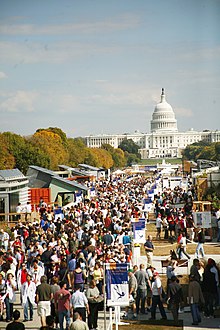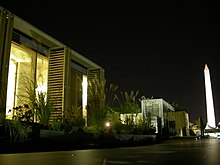Solar Decathlon
The Solar Decathlon ( English "Solar Decathlon") is an architectural and energy technology competition, which is offered by the US Department of Energy with the aim of designing an energy self-sufficient building for living in 2015. The houses are only allowed to cover their energy needs with self-produced solar power .
Twenty universities from all over the world selected in a preliminary decision are eligible to participate. The student teams have two years to plan and implement the construction project. Architectural and energy-related aspects must be harmonized in the planning, and the organization and financing of the project play an important role. The competition ends with a two-week, public final round of all teams on the National Mall in Washington, DC Here the colleges and universities compete against each other with their solar-powered homes and are judged in ten disciplines.
In summer 2008, the Solar Decathlon Europe was also launched, a European version of the competition, the results of which were presented for the first time in Madrid in 2010. The European competition, like the American one, has since been held every two years, alternating annually. The Solar Decathlon Europe is organized and hosted by the Polytechnic University of Madrid and the US Department of Energy .
10 competition disciplines 2009
Architecture - 100 points
Aesthetics, idea and architectural integration of the technologies are evaluated. The aim of the article is to show that solar as well as energetic aspects can be brought together successfully with architectural standards.
Technological implementation [engineering] - 100 points
The building envelope and building technology are assessed according to functionality, efficiency, innovation, robustness and economy.
Market Viability - 100 points
Several aspects are included in the assessment of marketability. On the one hand, the materials and raw materials used must be available to everyone on the market. On the other hand, the building is analyzed and evaluated for its profitability. Living quality, buildability and flexibility are the criteria. Compliance with deadlines, rules and building regulations also play a role.
Public Relations - 75 points
The Solar Decathlon is not only a competition, but also a public event. The focus of the public relations work is on communicating the project and its topics to a wide audience through a website and guided tours on site. The leadership is judged on the basis of its content, branding, hand-outs, its originality, appropriateness and its organization, while the website is only assessed on the basis of its content, branding and design.
Thermal comfort [Comfort Zone] - 100 points
The aspect of thermal comfort refers to the house's ability to control room temperature and humidity and keep them within certain limits. The room temperature should be 22-24 ° and the humidity 40-55%.
Technical equipment [appliances] - 100 points
In this part of the competition, the teams should show that their homes produce enough energy so that various household appliances and other electronic devices can be connected. In order to simulate conventional power consumption, in addition to operating the refrigerator (1-4 ° C) and freezer (-28.9 to -15 ° C), the washing machine (at least 43.3 ° C), dryer and dishwasher must also be used daily (48.9 ° C) can be used.
Hot Water - 100 points
This contest is intended to show that all the hot water required for a building can be generated from solar energy. For this purpose, the tests simulate the average amount of water and temperature during showering. Twice a day, teams must deliver 15 gallons (56.8 L) of hot water (110 ° F / 43.3 ° C) in less than ten minutes.
Lighting concept [Lighting Design] - 75 points
The quality of daylight and artificial light is assessed here. Both lighting concepts should be designed in such a way that no electricity has to be consumed during the day. The artificial light is assessed on the basis of its appropriateness, lighting scenarios, integration, control and outdoor lighting, while the daylight quality is assessed on the basis of controllability and atmosphere. Another aspect is the lighting of the workplace and the external appearance of the house at night.
Energy supply [net metering] - 150 points
This competition serves to prove that the sun can cover all the energies necessary for the daily needs of a 2 person household. Every house must at least be operated with a balanced energy balance; on the other hand, the feed-in of the surplus into the locally available power grid is measured. The team with the most surplus in net metering wins.
Home entertainment - 100 points
As part of the sub-competition, two dinner parties and an evening at the cinema are to be held, at which each team invites members of other teams to their house and is also rated by them.
Solar Decathlon 2021 Europe
The international competition will come to Germany for the first time in 2021. It will take place in Wuppertal in the immediate vicinity of the Wuppertal-Mirke train station directly on the Nordbahntrasse , a former railway line that has been converted into a cycle and footpath. The focus of the competition is on buildings as a component of urban transformation. The concept thus represents a further development of the content of the competition.
The “Solar Decathlon goes Urban” concept was developed by a team from Wuppertal , which also includes the Bergische Universität Wuppertal , the City of Wuppertal , the Wuppertal Institute , Stadtwerke , the New Efficiency and the Utopiastadt initiative . It first prevailed in the “EnEff Building 2050” ideas competition of the Federal Ministry for Economic Affairs and Energy and then in the “Call for Cities”, which the Solar Decathlon Europe Secretariat, the Energy Endeavor Foundation (EEF) and the US Department of Energy ( US DOE).
Solar Decathlon 2014 Europe
In 2014 the Solar Decathlon Europe 2014 took place in Versailles . Participants included the OnTop team from the Frankfurt University of Applied Sciences and the Rooftop team from the Technical University of Berlin and the Berlin University of the Arts, as well as the Erfurt University of Applied Sciences . The winner is Team Rhome from Italy with their project Rhome for DenCity .
Solar Decathlon 2013
In 2013, the competition was not held in Washington DC for the first time. The venue was the Orange County Great Park in Irvine, California . The winner was the Team Austria , a collaboration between the Technical University of Vienna , the University of Applied Sciences St. Poelten , the University of Applied Sciences Salzburg and the Austrian Institute of Technology . Second place went to the University of Nevada, Las Vegas, ahead of the Czech Technical University in Prague .
Solar Decathlon 2009
- 1st place: Technical University of Darmstadt
- 2nd place: University of Illinois
- 3rd place: Team California
Attendees:
Europe:
America:
- University of Arizona
- Cornell University
- University of Illinois
- Iowa State University
- University of Kentucky
- University of Louisiana at Lafayette
- University of Minnesota
- Ohio State University
- Pennsylvania State University
- University of Puerto Rico
- Rice University
- Team Alberta
- Team Boston
- Missouri University of Science and Technology
- Team Ontario / BC
- Team California
- Virginia Tech University
- University of Wisconsin – Milwaukee
Solar Decathlon 2007
The third competition was decided on October 19, 2007. The winner was the Technical University of Darmstadt, followed by the University of Maryland and Santa Clara University .
- 4th place: Pennsylvania State University
- 5th place: Polytechnic University of Madrid
- 6th place: Georgia Institute of Technology
- 7th place: University of Colorado
- 8th place: University of Montreal
- 9th place: University of Illinois
- 10th place: Rice University
Solar Decathlon 2005
- 1st place: University of Colorado , Denver and Boulder
- 2nd place: Cornell University
- 3rd place: California Polytechnic State University
literature
- Manfred Hegger (Ed.): Sunny prospects; Sunny Prospects: Team Germany's surPLUShome for the Solar Decathlon 2009; The surPLUShome of Team Germany for the Solar Decathlon 2009 Müller and Busmann, Wuppertal 2010, ISBN 978-3-928766-96-8 .
- Manfred Hegger (ed.): Sunny times. Sunny Times: Solar Decathlon House Team Germany Müller and Busmann, Wuppertal 2008, ISBN 978-3-928766-88-3 .
Web links
- Website of the Solar Decathlon Organizer (DOE)
- Temporal and technical development in the Solar Decathlon using a few examples
Individual evidence
- ↑ Federal Ministry for Economic Affairs and Energy: State Secretary Bareiß: Research for the future of energy supply in the building sector. Retrieved April 23, 2019 .
- ↑ Urban Solar Decathlon - International student innovation competition for buildings comes to Wuppertal. Retrieved April 23, 2019 .
- ↑ Solaradecathlon 2014 Versailles




